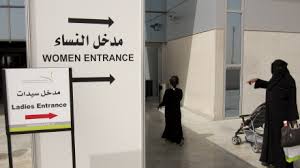In a limited sign of progress for women’s rights, admittedly rare for patriarchal Saudi Arabia, the passport department within the Saudi Ministry of Interior is drafting regulations that would allow Saudi women greater freedoms to travel without the immediate consent of a male guardian. The new rules challenge current Saudi codes prohibiting women under the age of 45 from traveling abroad without a male relative’s permission. It would also mean that women could travel domestically without obtaining consent from a government body. Currently, women have to jump through several hoops in order to travel within their own country; various codes force them to seek permission from government branches like the ministries of interior, justice, and social affairs.
Some media sources immediately misinterpreted the real impact of these new regulations. The Huffington Post incorrectly, albeit optimistically, claimed, “Saudi Arabia Considers Law Allowing Women to Drive without Man’s Permission.” While the Saudi government’s prejudiced edict forbidding women to drive cannot be repealed soon enough, the article misunderstands the extent to which minor bureaucratic tinkering can advance women’s rights. All this talk about potential regulations doesn’t mean anything unless the Saudi king passes hard legislation advancing basic freedoms for women.
The web of Saudi legislation is opaque, so it is not surprising that confusion persists. Officials have not set forth a timeline for the implementation of this potential new code (which does not appear to touch upon driving). Additionally, while the eliminated ministry paperwork will lessen some burdens for women travelers, it remains unclear whether or not male guardians will still have to accompany women traveling within the country.
This ambivalence speaks to a larger issue in Saudi policymaking. Different ministries can craft regulations within existing law, and the Shura (or Consultative) Council can draft legislation for the king’s review. Only the king, however, can “pass” legislation into law. In Saudi Arabia, this autocratic process makes any speculation over potential legal advancements superfluous.
Western outlets also have a record of interpreting Shura Council deliberations as genuine signs of progress. The Council, however, has a history of considering rights-enhancing laws that haven’t advanced beyond the introductory stages, perhaps a natural result of its inability to truly legislate. In 2014, the Council recommended that women be allowed to drive for some hours of the day, on certain days, while dressed modestly and chaperoned by either a husband or father. That recommendation has not made it to the King’s desk, with the government willing to detain female drivers under the pretense of fighting “terrorism.”
In the absence of governing checks and balances, trusting individual ministries or the Shura Council to actively reform discriminatory codes is senseless; instead of reporting on yet-unreleased regulations, the international community should be pressuring King Salman to deliver real reform. Ultimately, it is his responsibility to advance and protect the rights of Saudi women to be equal to the rights of men.
Rachel Kreisman is an intern at Americans for Democracy & Human Rights in Bahrain





